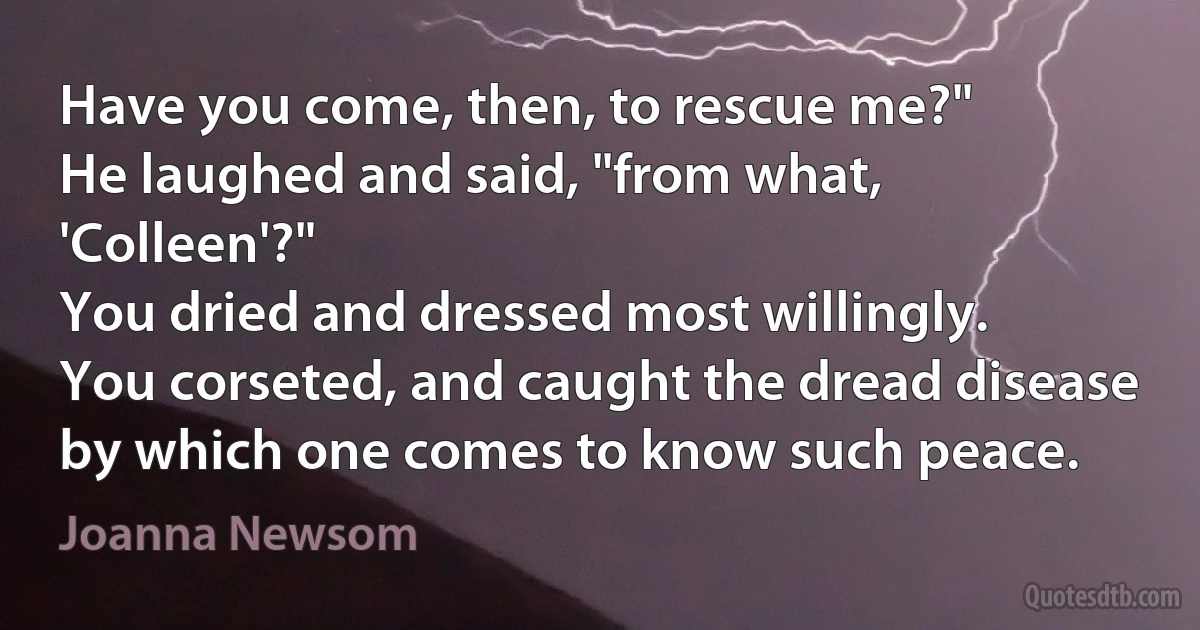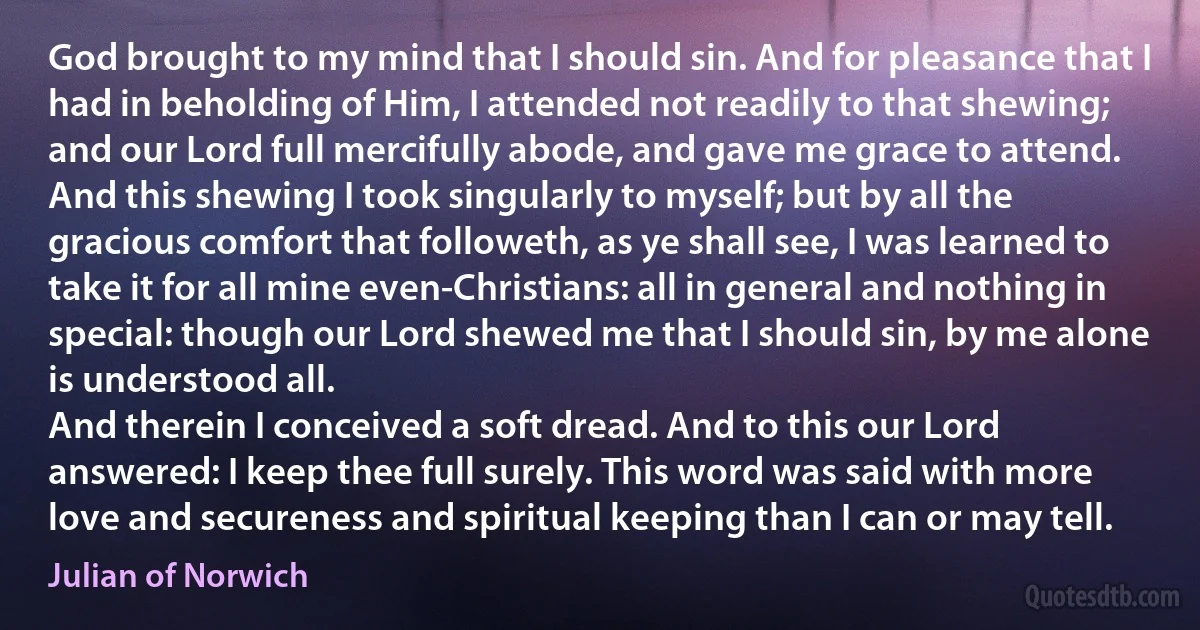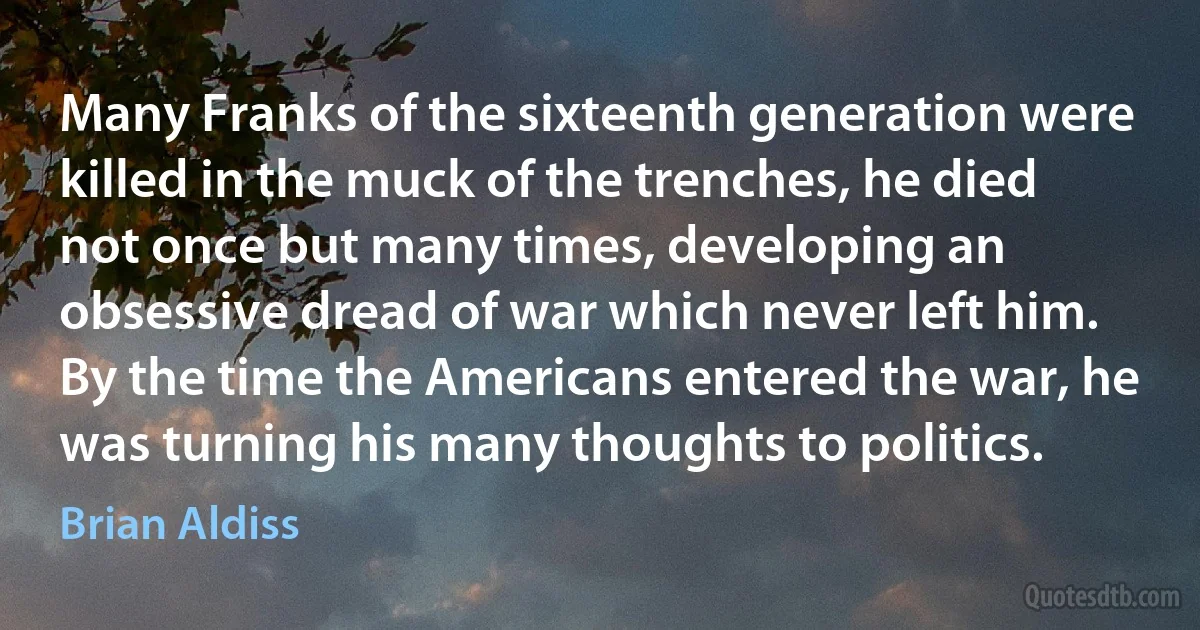Dread Quotes - page 5
No right was deemed by the fathers of the Government more sacred than the right of speech. It was in their eyes, as in the eyes of all thoughtful men, the great moral renovator of society and government. Daniel Webster called it a homebred right, a fireside privilege. Liberty is meaningless where the right to utter one's thoughts and opinions has ceased to exist. That, of all rights, is the dread of tyrants. It is the right which they first of all strike down. They know its power. Thrones, dominions, principalities, and powers, founded in injustice and wrong, are sure to tremble, if men are allowed to reason of righteousness, temperance, and of a judgment to come in their presence. Slavery cannot tolerate free speech. Five years of its exercise would banish the auction block and break every chain in the South. They will have none of it there, for they have the power. But shall it be so here?

Frederick Douglass
The ill-success of the projects of misdirected ingenuity has very naturally the effect of driving those men of practical skill, who, though without scientific knowledge, possess prudence and common sense, to the opposite extreme of caution, and of inducing them to avoid all experiments, and to confine themselves to the careful copying of successful existing structures and machines; a course which, although it avoids risk, would, if generally followed, stop the progress of all improvement. A similar course has sometimes... been adopted by men possessed of scientific as well as practical skill: such men having, in certain cases, from deference to popular prejudice, or from a dread of being reputed us theorists, considered it advisable to adopt the worse and customary design for a work in preference to a better but unusual design.

William John Macquorn Rankine
In the long run, the most vicious predators, like most dread disease-causing microbes, bring about their own ruin by killing their victims. Restrained predation-the attack that doesn't kill or does kill only slowly-is a recurring theme in evolution. The predatory precursors of mitochondria invaded and exploited their hosts, but the prey resisted. Forced to be content with an expendable part of the prey (its waste)... some mitochondria precursors grew but never killed their providers. ...The original prey was probably a larger bacterium like Thermoplasma.

Lynn Margulis
After Moses Himself she is the most blissful sight. I relationship was then form
But hereof am I not learned to long to see her bodily presence while I am here, but the virtues of her blessed soul: her truth, her wisdom, her charity; whereby I may learn to know myself and reverently dread my God. And when our good Lord had shewed this and said this word: Wilt thou see her? I answered and said: Yea, good Lord, I thank Thee; yea, good Lord, if it be Thy will. Oftentimes I prayed this, and I weened to have seen her in bodily presence, but I saw her not so. And Jesus in that word shewed me ghostly sight of her: right as I had seen her afore little and simple, so He shewed her then high and noble and glorious, and pleasing to Him above all creatures.
And He willeth that it be known; that all those that please them in Him should please them in her, and in the pleasance that He hath in her and she in Him.

Julian of Norwich
When our courteous Lord of His grace sheweth Himself to our soul, we have that we desire. And then we see not, for the time, what we should more pray, but all our intent with all our might is set wholly to the beholding of Him. And this is an high unperceivable prayer, as to my sight: for all the cause wherefor we pray it, it is oned into the sight and beholding of Him to whom we pray; marvellously enjoying with reverent dread, and with so great sweetness and delight in Him that we can pray right nought but as He stirreth us, for the time. And well I wot, the more the soul seeth of God, the more it desireth Him by His grace.

Julian of Norwich
It is known that afore miracles come sorrow and anguish and tribulation; and that is for that we should know our own feebleness and our mischiefs that we are fallen in by sin, to meeken us and make us to dread God and cry for help and grace. Miracles come after that, and they come of the high Might, Wisdom, and Goodness of God, shewing His virtue and the joys of Heaven so far at it may be in this passing life: and that to strengthen our faith and to increase our hope, in charity. Wherefore it pleaseth Him to be known and worshipped in miracles. Then signifieth He thus: He willeth that we be not borne over low for sorrow and tempests that fall to us: for it hath ever so been afore miracle-coming.

Julian of Norwich
All these our Lord shewed me in the first Sight, with time and space to behold it. And the bodily sight stinted, but the spiritual sight dwelled in mine understanding, and I abode with reverent dread, joying in that I saw. And I desired, as I durst, to see more, if it were His will, or else longer time the same.

Julian of Norwich
But in this I stood beholding things general, troublously and mourning, saying thus to our Lord in my meaning, with full great dread: Ah! good Lord, how might all be well, for the great hurt that is come, by sin, to the creature? And here I desired, as far as I durst, to have some more open declaring wherewith I might be eased in this matter.

Julian of Norwich
But what this deed should be was kept secret from me.
And in this I saw that He willeth not that we dread to know the things that He sheweth: He sheweth them because He would have us know them; by which knowing He would have us love Him and have pleasure and endlessly enjoy in Him. For the great love that He hath to us He sheweth us all that is worshipful and profitable for the time.

Julian of Norwich
The natural property of dread which we have in this life by the gracious working of the Holy Ghost, the same shall be in heaven afore God, gentle, courteous, and full delectable. And thus we shall in love be homely and near to God, and we shall in dread be gentle and courteous to God: and both alike equal.

Julian of Norwich
Desire we of our Lord God to dread Him reverently, to love Him meekly, to trust in Him mightily; for when we dread Him reverently and love Him meekly our trust is never in vain. For the more that we trust, and the more mightily, the more we please and worship our Lord that we trust in. And if we fail in this reverent dread and meek love (as God forbid we should!), our trust shall soon be misruled for the time. And therefore it needeth us much to pray our Lord of grace that we may have this reverent dread and meek love, of His gift, in heart and in work. For without this, no man may please God.

Julian of Norwich
All dreads other than reverent dread that are proffered to us, though they come under the colour of holiness yet are not so true, and hereby may they be known asunder. - That dread that maketh us hastily to flee from all that is not good and fall into our Lord's breast, as the Child into the Mother's bosom, with all our intent and with all our mind, knowing our feebleness and our great need, knowing His everlasting goodness and His blissful love, only seeking to Him for salvation, cleaving to with sure trust: that dread that bringeth us into this working, it is natural, gracious, good and true. And all that is contrary to this, either it is wrong, or it is mingled with wrong. Then is this the remedy, to know them both and refuse the wrong.

Julian of Norwich
Also in this same Shewing where I saw that I should sin, there was I learned to be in dread for unsureness of myself. For I wot not how I shall fall, nor I know not the measure nor the greatness of sin; for that would I have wist, with dread, and thereto I had none answer.
Also our courteous Lord in the same time He shewed full surely and mightily the endlessness and the unchangeability of His love; and, afterward, that by His great goodness and His grace inwardly keeping, the love of Him and our soul shall never be disparted in two, without end.
And thus in this dread I have matter of meekness that saveth me from presumption, and in the blessed Shewing of Love I have matter of true comfort and of joy that saveth me from despair.

Julian of Norwich
Father-dominated people who form father-dominated cultures have father-religions: a male deity, an authoritative scripture, a strong central government, an intolerance for inquiry and research, a repressive sexual attitude, a deep conservatism (for one does not change what Father built), a rigid demarcation, in dress and conduct, between the sexes, and a profound horror of homosexuality.
Mother-dominated people who form mother-dominated cultures have mother religions: a female deity served by priestesses, a liberal government-one which feeds the masses and succors the helpless-a great tolerance for experimental thought, a permissive attitude toward sex, a hazy boundary between the insignes of the sexes, and a dread of incest.

Theodore Sturgeon
No more, America, in mournful strain
Of wrongs, and grievance unredress'd complain,
No longer shalt thou dread the iron chain,
Which wanton Tyranny with lawless hand
Had made, and with it meant t' enslave the land.
Should you, my lord, while you peruse my song,
Wonder from whence my love of Freedom sprung,
Whence flow these wishes for the common good,
By feeling hearts alone best understood,
I, young in life, by seeming cruel fate
Was snatch'd from Afric's fancy'd happy seat:
What pangs excruciating must molest,
What sorrows labour in my parent's breast?
Steel'd was that soul and by no misery mov'd
That from a father seiz'd his babe belov'd:
Such, such my case. And can I then but pray
Others may never feel tyrannic sway?

Phillis Wheatley



